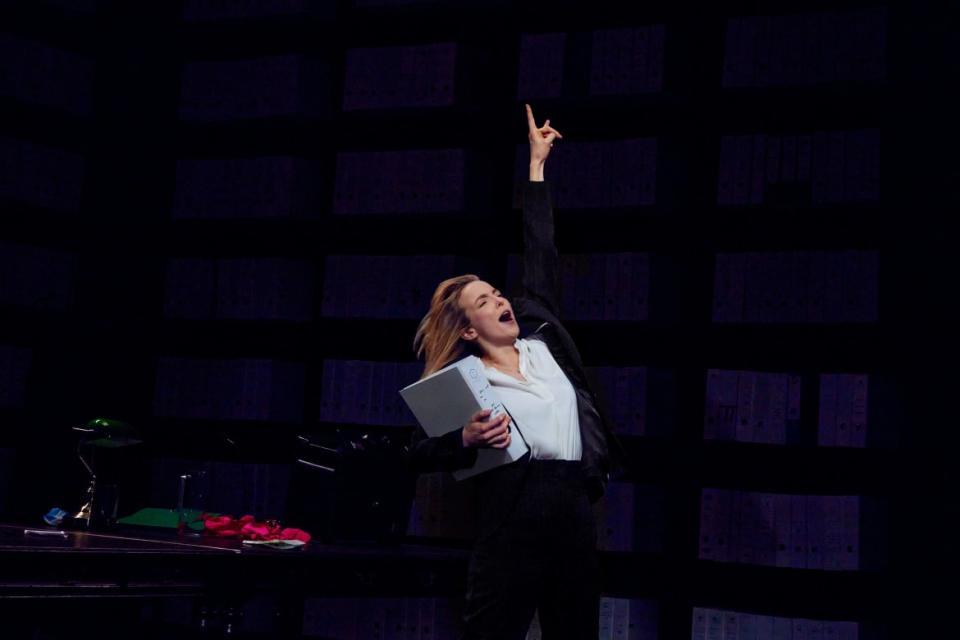Review: Jodie Comer Makes ‘Prima Facie’ Broadway’s Most Powerful Show

- Oops!Something went wrong.Please try again later.
- Oops!Something went wrong.Please try again later.
More than once, Jodie Comer’s character Tessa Ensler declares “This is me” in Suzie Miller’s searing one-woman Broadway play, Prima Facie (Golden Theatre, booking to June 18). The declaration resonates because Tessa is in no way any kind of stereotype—of a lawyer, a young woman, or victim of rape. She is a complex me, who Comer—in an astonishingly acted monolog—makes the center of a striking piece of theater directed by Justin Martin. In London earlier this month, Comer won the Olivier Award for Best Actress for her performance, while the play won Best New Play—and both must surely be Tony Award favorites here.
Bar one pause in the intermission-less 100 minutes, Killing Eve star Comer is on stage throughout, inhabiting Tessa and a gallery of other characters—including her mother, best friend, and rapist. But most stunning is her presentation of Tessa who both goes through so much, and seems so much. The play is a blunt polemic against a patriarchal legal system weighted against female victims of sexual violence; Comer’s performance and Martin’s staging deepens the text into a one of the most electrifying pieces of theater on Broadway this season.
“Prima facie” means “on the face of it” in Latin, and the play is an indictment of what that means in terms of the law and legal process itself—and how it misses so much, and also, when it comes to Tessa, an interrogation of character that at first seems a simple hero to root for: the working-class girl made good.
Review: ‘Peter Pan Goes Wrong’ Has Such Fun Causing Chaos
The play begins with Tessa in an office setting in boastful, swaggering mode, surrounded by shelves of legal books, and two wooden tables—decoration that Comer somehow (as well as all else she does) maneuvers to create new settings. Tessa is describing the adrenaline high of combat in court in terms of a horse race, “very muscle pumped, trained, and ready for the sprint.” She is confident, unbreakable, savvy, funny. Winning is everything and proudly accomplished—“My client, the accused, is awestruck”—even if “the barristers’ rule is the winner can’t flaunt it. Every winner might be the one who loses the next day.”
The first shift away from the legal world takes us, just by a softening of lighting, onto a train with Tessa returning to her working-class home in Liverpool, “a long ride to Mum’s, the ‘gloss’ of this legal life melts into my seat.” Comer’s performance of Miller’s words is so commanding we envision immediately every setting, including first the modest house she returns to. “Mum lights up a ciggie, tells me the Fanta isn’t sugar-free. Fail. Asks me to chop the veg. She’s been cleaning offices all day, offices like the one I work in.” Her very sweet mother gives her a hot pink polyester shirt. “I saw it on sale, looks like what a lawyer would wear.”
It would be impressive enough if Comer memorized and delivered Prima Facie as is, but the play’s texture and pace is aided by Miriam Beuther’s set, which subtly changes as the show goes on, with just-as-artful lighting design by Natasha Chivers, and sound design by Ben and Max Ringham adding extra effective atmospherics.
The play moves around in time, and so it is Tessa takes us back to law school at Cambridge University, where the dean informs the class, with a trace of Miss Jean Brodie, that they are “the crème de la crème.’” The class likes to hear they will change the world. “Never assume anyone is telling you the truth—even yourself,” the dean says. “There is no real truth, only legal truth. Don’t trust your gut instincts, only your legal instincts.” Tessa comes to believe not just this, but that the law is a game; each side tells a story, the jury decides which to believe. Because she typically defends the accused, when one woman who claims to have been assaulted says, “I’m not getting anything out of this, I don’t want to be here. I’m just doing this to protect other women from this man,” Tessa does not know what to think—until she herself becomes the victim.
Comer impressively inhabits so many body and mind-moods in the show, such as in a sweaty club, dancing, letting “go of it all,” and then having consensual sex with her colleague Julian in the office. We see a person embracing and in charge of her sexual freedom, and then broken.
In words, tone, and bearing, Comer conveys many things almost simultaneously. There is the sense of violation of the assault, but there is also the sense of a personality and belief system utterly upended. Right in front of us, Comer transforms into a suddenly unsure, shattered character. Tessa immediately imagines the questioning of her in court. “The restaurant bill indicates there was a lot of sake drunk by you both, witnesses say you were giggling, yes?” “And there are two empty red wine bottles at your house wouldn’t you agree?” “You took off most of your clothes, is that right?”
Desperate and upset, Tessa leaves her own apartment with her rapist asleep in her bed, rain drenching the stage. Tessa just wants the comfort of the “rough heat” of her mother.

Jodie Comer in "Prima Facie."
Miller has a background in law, and heard the experiences of many women who had been sexually assaulted; Tessa is an amalgam of those women. “I just didn’t believe in the system,” Miller told Guardian Australia in 2019. “The one area that I think they’ve got wrong, really wrong, is consent, lack of that, and believing women.”
“The way it’s operating is to interrogate the woman, not to interrogate the crime,” Miller said of the law. “This is a he-said/she-said case. There’s often very little other evidence. They’re often in complete agreement that the sex act happened, but it’s whether it was consensual or not.”
In the play, injustices accrue. Julian plays dumb, and paints Tessa as the aggressor. A number-scroll on stage makes clear it takes 782 days from the time of Tessa’s assault to an actual court date. “This. Is. Me. Outside looking in. Watching myself,” Tessa says on that day of reckoning. “No armor.” As she waits, she recalls the hospital bed at the sexual assault unit, the forensic medical examination, the police questions, how much of an “idiot” she feels having taken a shower after the assault. She knows the process, but it feels like a “slap,” to be told the Crown Prosecution Service will decide to pursue it as a case or not.
Her professional identity now in apparent tatters, Tessa remains focuses on the girl within her “who fought to be seen,” as a source of strength, even though she berates herself for taking Julian home in the first place. She wants to remain resolute in her belief in law, but in the cross-examination in court—told by a series of her halting responses—she feels “a terrible wrong being done to me right now.” The rape accusation is recast by Julian’s lawyer as a vehicle for revenge. Her doughty mother remains her biggest support.

Jodie Comer poses with the award for Best Actress for "Prima Facie" at the Olivier Awards at the Royal Albert Hall in London, Britain, April 2, 2023.
Comer gives an astonishing, raw, and unflinching performance, as she conveys how Tessa feels she has “lost my dignity and my sense of self. I have lost my career path, friends, peace of mind, my safety. The sense of joy in my sexuality. But most of all, I have lost my faith in this, the law, the system I believed would protect me. The system I dedicated my life to.”
The play does not illustrate any regret Tessa may have had about how she conducted herself in her professional life before, or how this experience will or will not transform her vocation, her passionate love of the legal system, or relishing the fight. What other side has her own case ensured has Tessa crossed over to, and where will it take her? The play somewhat leaves the character behind to let its arguments and polemic to supersede her.
Prima Facie becomes even more declarative towards its end, as Tessa finally has her say in court; because of British law, her verbal demolition of the law is done without a jury present. The law is made to interrogate the victim, rather than the facts, she says. The house lights are brought up to convey—“look to your left, look to your right”—that one in three women will be a victim of sexual assault.
Something has to change, Tessa says to us finally. The stage is wreathed in stark, funereal darkness by this point; no law books, no swagger—just Comer-as-Tessa’s determined presence center stage. In the face of the obduracy of the law itself, the heart of Prima Facie is to focus on Tessa’s, and women like her, anger and strength as the ultimate vehicles for change. As Prima Facie makes powerfully clear, if the law was fit for purpose neither should be necessary.
Get the Daily Beast's biggest scoops and scandals delivered right to your inbox. Sign up now.
Stay informed and gain unlimited access to the Daily Beast's unmatched reporting. Subscribe now.

